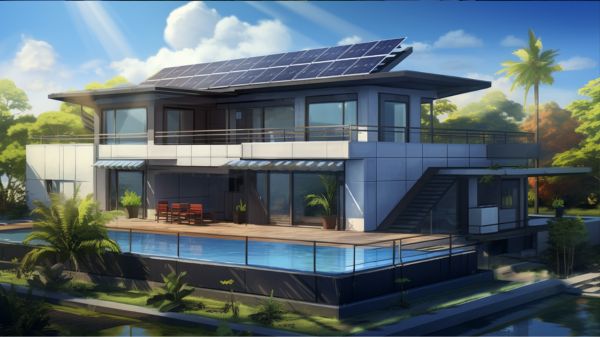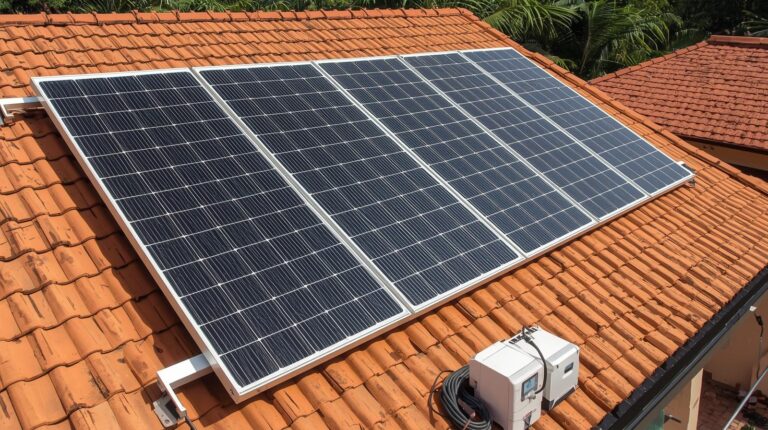Are you tired of sky-high energy bills and want to take control of your home’s energy efficiency? Look no further! In just 9 easy steps, you can boost your home energy efficiency with solar power.
From assessing your current energy consumption to implementing energy-efficient appliances and practices, this article will guide you through the process.
Say goodbye to excessive energy bills and hello to a more sustainable and cost-effective lifestyle. Get ready to harness the power of the sun and transform your home today!
Assess Current Energy Consumption
To boost your home energy efficiency with solar power, start by assessing your current energy consumption. Conducting an energy audit is a crucial step in understanding how much energy your home consumes and where potential energy savings can be made.
Begin by examining your utility bills to determine your average monthly energy usage. Next, inspect your home for any energy inefficiencies, such as drafty windows or gaps in insulation. Consider hiring a professional energy auditor who can provide a more detailed analysis of your home’s energy usage and suggest energy-saving tips tailored to your specific needs.
Simple changes like replacing traditional light bulbs with energy-efficient LED bulbs or installing programmable thermostats can make a significant difference in reducing your energy consumption and saving money in the long run.
Determine Suitable Solar Power System Size
Now that you have assessed your current energy consumption, it’s time to determine the suitable size for your solar power system. The optimal system size will depend on factors such as your energy requirements and available roof space.
Optimal System Size
Maximizing your energy savings and minimizing your environmental impact starts with determining the ideal size for your solar power system. To find the optimal system size for your home, consider the following factors:
- System capacity: Assess your energy usage and determine the capacity of the solar power system needed to meet your needs. Consider factors such as the number of occupants in your home, the types of appliances you use, and your typical energy consumption patterns.
- Roof space: Evaluate the available roof space for solar panel installation. The size of your roof will help determine the maximum capacity of the solar power system you can install.
- Budget: Consider your budget when determining the optimal system size. While a larger system may generate more electricity, it may also come at a higher cost. Find a balance between your energy needs and your budget.
- Future energy needs: Take into account any anticipated changes in your energy usage. If you plan to add more appliances or expand your household, consider a slightly larger system size to accommodate future needs.
Calculating Energy Requirements
You can determine the suitable size for your solar power system by calculating your energy requirements. To start, you need to analyze your energy consumption. Look at your utility bills to determine your average monthly energy usage. Consider both peak and off-peak periods, as well as seasonal variations.
Once you have this information, you can calculate the solar panel efficiency needed to meet your energy demands. Solar panel efficiency refers to the amount of sunlight a panel can convert into usable electricity. Keep in mind that not all solar panels have the same efficiency ratings.
Cost-Effective Solar Solutions
To determine the suitable size for your solar power system, continue analyzing your energy consumption and incorporate the data into calculating the optimal size.
Here are four key considerations to keep in mind:
- Energy needs: Calculate your average daily energy consumption by reviewing your electricity bills. This will help you determine the size of the solar power system required to meet your energy needs.
- Roof space: Assess the available roof space to determine the maximum number of solar panels that can be installed. Consider shading, obstructions, and any potential future expansions.
- Budget and financing: Evaluate your budget and explore solar panel financing options. Many financial institutions offer loans or leasing programs that can help make solar power more affordable.
- Government incentives: Research the government incentives available in your area, such as tax credits or rebates for installing solar panels. These incentives can significantly reduce the overall cost of your solar power system.
Research Reputable Solar Power Installers
Now that you have determined the suitable size for your solar power system, it’s time to research reputable solar power installers.
Finding a trustworthy installer is crucial for a successful and reliable solar installation. Take the time to evaluate the installer’s reputation, read reviews, and ask for recommendations from friends or family who’ve already gone through the process.
Trustworthy Solar Installer
Researching reputable solar power installers is essential for finding a trustworthy solar installer. When it comes to installing solar panels on your home, you want to ensure that you’re working with a reliable solar contractor who’s the necessary expertise and experience.
To help you find the right solar installer, here are some key steps to take:
- Ask for recommendations: Reach out to friends, family, and neighbors who’ve already installed solar panels and ask for their recommendations on reliable solar contractors.
- Check certifications: Look for certified solar professionals who’ve received training and certifications from reputable organizations. This ensures that they’ve the necessary knowledge and skills to install solar panels properly.
- Read online reviews: Take the time to read online reviews from previous customers. This will give you an idea of the quality of their work and customer satisfaction.
- Get multiple quotes: Obtain quotes from different solar installers to compare prices and services. This will help you make an informed decision and find the best value for your money.
Evaluate Installer’s Reputation
Start by asking for recommendations from friends, family, and neighbors who’ve already installed solar panels to find a reputable solar power installer.
Evaluating an installer’s reputation is crucial in ensuring that you receive quality service and reliable solar power system installation.
Begin by researching the qualifications and certifications of potential installers. Look for professionals who’ve received proper training and have experience in solar panel installation.
Additionally, take the time to compare the pricing of different installers. While it’s important to find a competitive price, remember that the cheapest option may not always be the best. Consider the overall value that each installer offers, including their reputation, qualifications, and warranties.
Obtain Multiple Quotes for Installation Costs
First, gather multiple quotes for solar power installation costs to ensure you get the best deal for your home energy efficiency upgrade. Comparison shopping is essential when it comes to finding the most competitive prices and ensuring you aren’t overpaying for your solar installation.
Obtaining multiple quotes allows you to compare the costs and services offered by different solar installers, giving you a better understanding of the market and helping you make an informed decision. Here are four key reasons why obtaining multiple quotes is important:
- Cost Comparison: Gathering multiple quotes will help you understand the average cost of solar installation in your area, ensuring you don’t pay more than necessary.
- Quality Assessment: Different installers may offer different levels of expertise and quality of work, so obtaining multiple quotes allows you to assess their qualifications and reputation.
- Financing Options: Each installer may have different financing options available, and obtaining multiple quotes gives you a chance to compare and choose the most favorable terms.
- Negotiating Power: With multiple quotes in hand, you have the opportunity to negotiate and potentially secure a better deal for your solar installation.
Secure Necessary Permits and Approvals
To begin the process of securing necessary permits and approvals for your solar power installation, you’ll need to contact your local government office. They’ll provide you with detailed information about the permit application process and the specific requirements you need to meet.
It’s important to comply with local building codes to ensure the safety and integrity of your solar power system. These codes are in place to regulate construction and ensure that your installation meets certain standards.
Schedule Installation and Wiring
Once you have obtained the necessary permits and approvals, it’s time to schedule the installation and wiring of your solar power system. Here are four key steps to help you with this process:
- Research qualified electricians: Start by finding reputable electricians who specialize in solar power installations. Look for professionals with relevant certifications and experience in the field.
- Schedule appointments: Contact the electricians you have shortlisted and schedule appointments for them to visit your home. During these appointments, they’ll assess your property and provide you with a detailed quote for the installation and wiring.
- Compare quotes: Once you have received quotes from different electricians, compare them to determine the best option for your budget and needs. Consider factors such as cost, reputation, and the quality of equipment they’ll be using.
- Finalize the installation: Once you have chosen an electrician, schedule a date for the installation. Make sure to communicate any specific requirements or preferences you may have to ensure a smooth process.
Monitor and Optimize Solar Power System
Now that the installation and wiring of your solar power system have been completed, it’s time to start monitoring and optimizing its performance.
Regular solar power maintenance is essential to ensure that your system continues to generate electricity efficiently. One way to do this is by using remote monitoring technology.
This allows you to keep track of your system’s performance from anywhere, using your smartphone or computer. You can easily monitor the amount of electricity being generated, check for any issues or malfunctions, and even receive alerts if something requires attention.
By identifying and addressing any potential problems early on, you can maximize the efficiency and lifespan of your solar power system.
Implement Energy-Efficient Appliances and Practices
You can further enhance the energy efficiency of your home by implementing energy-efficient appliances and practices. Here are four energy-saving habits and energy-efficient appliances that you can incorporate into your daily routine:
- Upgrade to Energy Star-certified appliances: Replace your old appliances with energy-efficient ones that bear the Energy Star label. These appliances are designed to use less energy without compromising performance.
- Install a programmable thermostat: A programmable thermostat allows you to set specific temperatures for different times of the day. This helps you optimize your heating and cooling systems, reducing energy waste when you’re not at home or during sleeping hours.
- Use LED light bulbs: LED bulbs are more energy-efficient than traditional incandescent bulbs. They use less energy and last longer, saving you money on your energy bills.
- Practice energy-saving habits: Simple habits like turning off lights when not in use, unplugging electronics when not in use, and using natural light whenever possible can make a significant difference in your energy consumption.
Enjoy the Benefits of Reduced Energy Bills
To fully reap the rewards of reduced energy bills, embrace the advantages of solar power for your home. By installing solar panels, you can significantly reduce your carbon footprint. Solar power is a clean and renewable energy source that produces electricity without harmful emissions. By reducing your reliance on fossil fuels, you can contribute to a healthier environment for future generations.
Additionally, investing in solar power can also increase the value of your home. Studies have shown that homes with solar panels sell for higher prices and have shorter selling times compared to homes without solar installations. So not only will you enjoy the benefits of reduced energy bills, but you’ll also be making a smart financial decision.
Go solar and start saving today!
Conclusion
Congratulations! By following these 9 easy steps, you have unlocked the secrets to boosting your home energy efficiency with solar power. Just like a bright sun rising on a new day, your decision to go solar will illuminate your path towards a greener and more sustainable future.
With reduced energy bills and the satisfaction of knowing you’re making a positive impact on the environment, it’s time to sit back, relax, and enjoy the sunny benefits of your solar-powered home.




